#good discipline
Quote
Hunger is good discipline and you learn from it; but you can work something out. And as long as they do not understand it you are ahead of them.
from A Moveable Feast by Ernest Hemingway
#a moveable feast#ernest hemingway#papa hemingway#hemingway#hunger#hungry#good discipline#discipline#learn from it#work something out#be ahead#get ahead#stay ahead
5 notes
·
View notes
Text


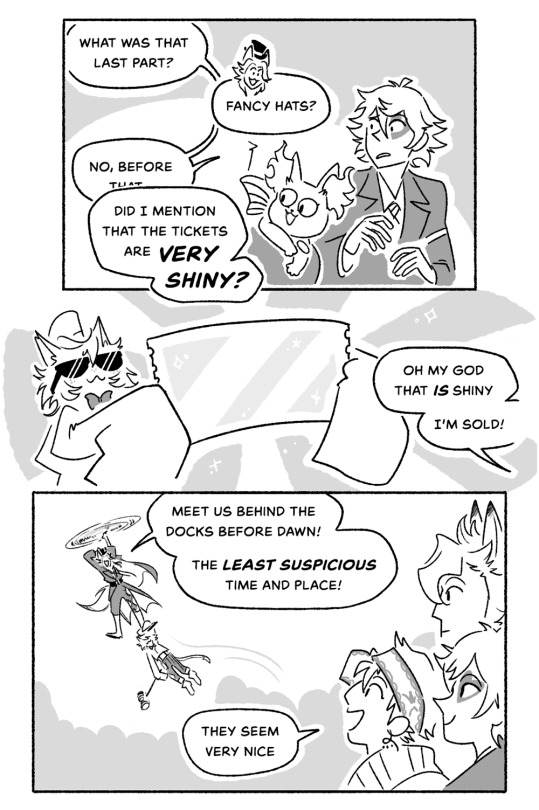
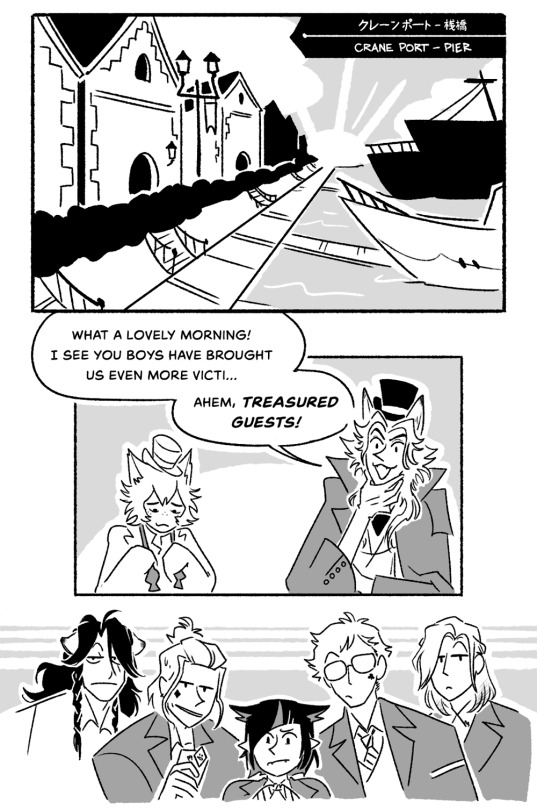
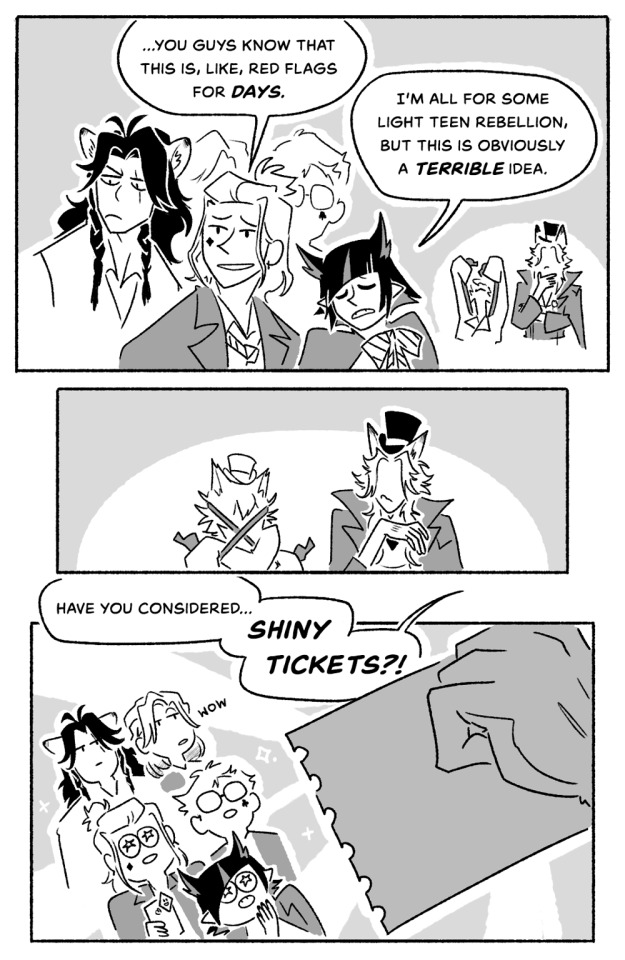
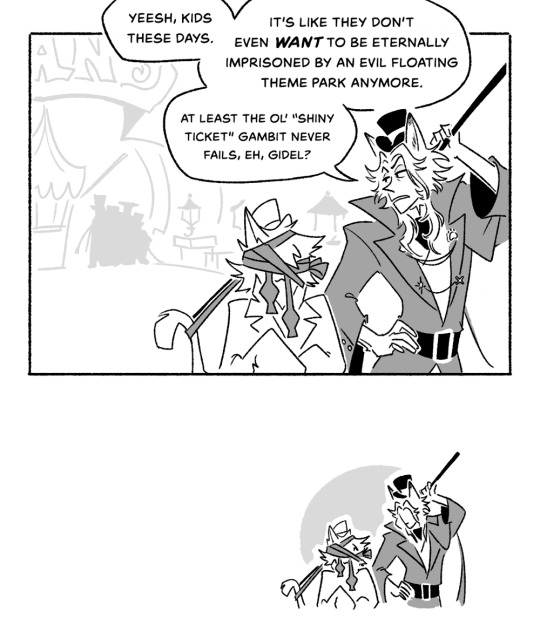
this is basically what happened, right?
(these guys are very lucky that everyone at NRC 1) has the combined intelligence of a sack of bricks, and 2) is easily distracted by shiny things.)

#art#twisted wonderland#twisted wonderland spoilers#stage in playful land#stage in playfulland#these two are SO sleazy and i am utterly delighted by them#can't wait to find out their tragic backstory in approximately 3-4 weeks!#fortunately i have like a month to figure out how the heck to draw their hair (spoiler: i will never figure it out)#also. god. i love it whenever leona accidentally reveals his Mom Side.#he doesn't care about any of this but he WILL be tagging along to make sure no one else gets into trouble#once again he has to be the Responsible Adult and he hates it. the whimsical hat weighs heavy upon his head.#anyway this is me so excuse me while i now talk about diasomnia for three hours#but lilia being all 'kids gotta have some adventure in their lives!' is hilarious#specifically because you know silver would NEVER.#100% silver not only never snuck out but he always went to bed on time AND brushed his teeth AND flossed even when nobody made him.#lilia: aww but you should be enjoying your youth! >:c#silver: i am. i enjoy being respectful and disciplined and honoring you as my father.#lilia:#lilia: maybe i'm TOO good at raising kids#you know i was going to say none of his kids would be involved in this but i actually think malleus definitely would#he would not see it as a moral quandry though. he would just be excited to be invited along.#(the only reason he isn't there is because he was busy admiring a termite-infested beam somewhere and yuu didn't get a chance to ask him)#i mean MAYBE if lilia as his single authority figure told him no then he would have some reservations#but lilia's the one who's screaming HELL YEAH LET'S SNEAK OUT AND DEFY AUTHORITY while dabbing so moot point there#sebek would never and he would rat on everyone else. unless malleus is going in which case he's already there.#and i guess if everyone else is going silver probably would too#but he'd. y'know. feel conflicted about it.
5K notes
·
View notes
Text
How to Build Self Discipline
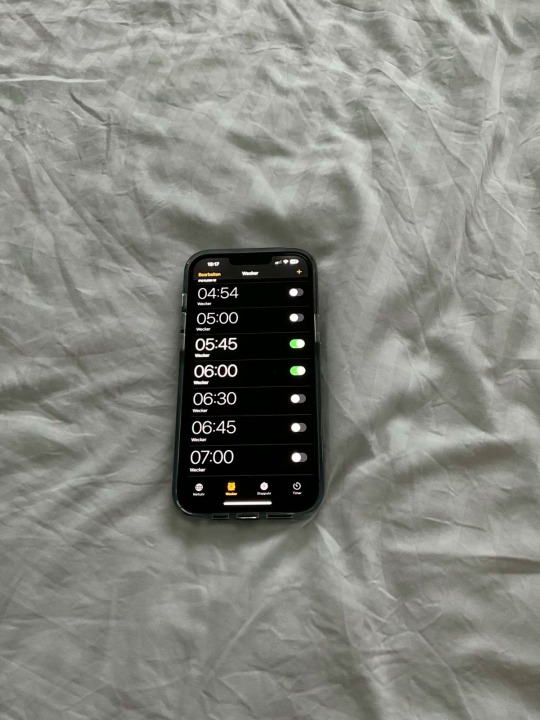

Cultivating self-discipline is the way towards personal growth and achieving long-term goals. To me, it’s really all about making choices that honor your well-being and identity.
Understand that self-discipline is about self love and respect
It’s not about punishment or deprivation, but rather caring for yourself enough to make choices that align with your long-term well-being and goals.
You’re showing yourself the respect you deserve by honoring and committing to changes you want to make.
It’s all about recognizing your worth and having the motivation and courage to pursue what’s really best for you, even when it requires a lot of effort and decision-making.
Frame your identity in a way that includes discipline
How we act directly ties to our identities and how we believe we are. If you believe you’re a successful individual, you’ll live a life framed by confidence and determination. If you believe you’re someone who is lazy and unmotivated, you’ll struggle to find the drive to pursue your goals and aspirations.
Gaining discipline is all about acting as the person you believe you are and moving through life in a way that’s consistent with your determined identity. The key here is to try to imagine who you are at your highest self in a disciplined state of mind.
To start this, ask yourself these questions and slowly arrange your life in a way so there’s no distance between who you are now and your highest self:
What does your day look like
What do you eat
What do you wear
What does your week look like
What does your work day look like
What hobbies do you have
What’s your morning and night routine
Who are you surrounded by
What do you say yes and no to
Have systems in your life
I recently wrote a post about habits and mentioned the idea of systems versus goals. Here, I want to delve a bit deeper into that concept within the context of self-discipline.
To me, another way to truly live a disciplined life is to establish starting systems, something that will propel you past hurdles and reduce the friction that accompanies change.
Let’s say you want to improve your eating habits and cultivate discipline in consuming less sugar while incorporating more whole foods into your diet. You could begin by implementing a system of prepping healthy snacks or meals in advance at the start of each week, or however you see fit. By having these snacks readily available, you eliminate the need for decision-making, making it easier to adhere to your goal.
Anything that serves as a reminder or facilitates consistent action toward your desired outcome is a valuable system in your life.
Be okay with not doing something and embrace the mindset of small wins
This may seem paradoxical in the context of developing self-discipline, but being okay with not doing something is crucial. There are times in life when we need tough love and motivation, but there are also moments when compassion is the driving force that propels us forward.
When you don’t follow through with something, whether it’s going for a run or preparing a healthy dinner, it’s important to be okay with it. You don’t need to shame yourself or feel guilty for not taking action because that will only reinforce negative thought patterns, making it harder to create the change you desire.
Consider this: if you miss a planned run and spiral into self-criticism, you’re more likely to avoid running altogether. However, if you approach the situation with understanding and compassion, you’ll be more inclined to try again next time.
This is where small daily victories come into play. Sometimes, all we need is one small step forward to develop a new habit and maintain consistency. Whatever you're striving to improve or change, if it feels daunting, tell yourself, "Just for today, I'll do a 15-minute workout instead of the full hour," or "Just for today, I'll read 5 pages instead of the entire chapter," and celebrate these as small victories. Doing so not only helps you establish new habits but also allows you to acknowledge the progress you've made and the trust you've built within yourself.
—Luna

#that girl#good habits#itgirl#leveling up#level up#aesthetic#habits#productivity#self improvement#self discipline#discipline#self love#self respect#self reflecting#reflection#self care era#self care#dream#dream girl#mental growth#femininity
2K notes
·
View notes
Text

Sgt. Hunter
I’m making a series of the Bad Batch members leading up to the finale. Stayed tuned for the others. For now, please enjoy our favorite sergeant.
Procreate
See the other Bad Batch members in this series:
Echo
Wrecker
Crosshair
#the bad batch#star wars#topazblitz#tbb hunter#the bad batch hunter#hunter#star wars the bad batch#clone force 99#clone troopers#procreate#digital illustration#digital painting#digital art#digital drawing#sgt hunter#sergeant hunter#sw tbb#I draw my clones with good trigger discipline#the bad batch fanart#star wars fanart#fanart
466 notes
·
View notes
Text
One thing that I feel is really interesting and often forgotten about Essek is that fundamentally, his characterization has been from the start based upon his desperation for external perspectives and connection, which, along with much of his narrative and mechanical positioning, means that he actually has an extraordinary and almost (but not actually, as I'll show) counterintuitive capacity for both growth and trust.
(Buckle in. This is a long one.)
In particular, I would argue, knowing now that many places where the plot touches Ludinus have long been marked for connecting back into the current plot, that he was quite possibly built as a prime candidate for radicalization by the Ruby Vanguard. He felt isolated from his culture, he was desperate for other connection, and he was certainly of the type to believe he was too smart to be drawn into such a thing, given his initial belief that he could control the situation and the fallout. If things had gone any other way, he easily could've been on the other side by now.
As such, he has been hallmarked by being fairly open to suggestion, perhaps for this reason, but the thing about that kind of trait is that it is both how people are radicalized and deradicalized. This is certainly true of Essek, who experienced genuine kindness and quite frankly strangeness from the Nein and was able to move from the isolation the Assembly had engendered to meaningful and genuine connection, largely propelled by his own internal reflection. By the time Nein are aware of his crimes, he's already begun to express regret to an extent and, furthermore, doubt in the Assembly, including explicitly drawing a line against Ludinus, even in a position where he was on his own and probably quite vulnerable.
Similarly, when the Nein reach the Vurmas Outpost some weeks later, he has moved from regret for the position he's ended up carrying a heavy remorse. This makes sense! He's fairly introspective, seems used to spending a lot of time in his own head, and was left with plenty to mull over. It's not some kind of retcon for him to have progressed well past where the Nein left him; it just means he's an active participant in the world who has done his own work in the meantime.
This is another interesting aspect to him. I've talked about this a bit before but I cannot find the post so I'll recap here: antagonists in D&D have significantly more agency than allied NPCs. Antagonists are active forces, against which the party is meant to struggle; allies are meant to support the PCs, which means they tend to be more passive in both their actions and their character growth. Essek was both built as an antagonist, in a position that gives him significant agency, and also was then given significant opportunity to grow specifically to act as a narrative mirror for Caleb's arc. Even when he becomes a more traditional D&D ally, he still retains much of that, though he occupies a supporting role.
I believe that this is especially true because of the nature of Caleb's arc, which I've already written on; the tl;dr of this post is that Caleb is both convinced that he is permanently ruined and also desperate to prove that change is possible. Essek is that proof, because he is simply the character in a position to do so. But this also means that his propensity for introspection and openness is accentuated! He has to do the legwork on his own, for the most part, because that's where he is in the meantime.
But he still ends the campaign necessarily constricted; he is under significant scrutiny, he's at risk from the Assembly, and he goes on the run fairly soon after the story ends. He spends most of the final arc anxious and paranoid, which is valid given the crushing reality of his situation. It would be very easy to extrapolate that seven years into this reality, he would be insular, closed off, and suspicious of strangers, even in spite of the lessons he's learned from the Nein and their long term exposure.
So seeing his openness and lightness now is surprising, but at the same time, given this combination of factors in his position in the narrative over time and his defining traits, it's not by any means unreasonable.
But one thing that I found so delightful is how much trust he exhibits, which is obviously a wild thing to say about Essek in particular, given much of what he learns is both earning and offering trust, which was something he says explicitly in 2x124 that he's never really experienced: "I've never really been trusted and so I did not trust." It makes up much of the progression of his relationship with Caleb, and the trust that he is offered by the Nein in walking off the ship is the impetus he needs to grow.
But I think it's easy to talk about trust when it comes to people who have proven themselves to you or to whom you've ingratiated yourself, and that's really the most we can say about Essek by the time he leaves the Blooming Grove. There is this sense in a lot of discussion of trust (not solely in this fandom) that it is only related to either naivete or love, but there's far more to it. Trust at its best is deliberate—cultivating an openness to the world at large is a great way to combat cynicism and beget connection instead. It allows a person to maintain curiosity and be open to experience, but it can be incredibly difficult to hold onto.
It is clear that the Essek we meet now is a very pointedly and intentionally trusting individual. He trusts Caleb and by extension Caleb's trust in Keyleth, as he shows up and picks up a group of strangers from a foreign military encampment and walks in without issue. He trusts the Hells to follow his lead moving through Zadash and to exhibit enough discretion so as to avoid bringing suspicion upon all of them. He trusts that Astrid will respond well to his entrance, but he also trusts himself and the Hells enough to execute a back-up plan in the case that she doesn't. In the end, he even trusts them enough to give them his name and identity.
He doesn't scan as someone who has spent half a dozen years living like a prey animal, afraid of any shadow he runs across in an alley, withdrawn into himself and an insular family, which would've been an easy route for him to take. He scans as someone who has learned the kind of trust borne of learned confidence and a trained eye for good will and kindness, which are crucial weapons one would need for staving off cynicism in his circumstances—as if he has survived thanks more to connection and kindness than paranoia and isolation. (If we want to be saccharine about it, he scans quite poignantly as a member of the Mighty Nein.)
So it is easy to imagine this trust and openness as a natural progression of his initial search for perspectives external to his own cultural knowledge. Though he makes those first connections with the Assembly to try to vindicate his personal hypotheses, he finds in them exposure to the deepest corruption among Exandrian mortals, which could've—and did, for a time—turned him further down that same dark path.
But it's also this same openness to exposure from the wider world that allows the Nein to influence him for the better, and in spite of the challenges he's certainly faced simply surviving over the past seven years, he seems to have held onto this openness enough to move through the world with self-assurance and a willingness to extend the kinds of trust and good will that he has been shown.
(I would be remiss not to mention that I was reminded about my thoughts on this by this lovely post from sky-scribbles and their use in the tags of 'light' to describe Essek's demeanor this episode, which is really such an apt word for it.)
#something something hope is a weapon hope is a discipline hope is a garden to cultivate!!!#HE'S SO GOOD HE IS TRULY EXEMPLAR OF THE WHOLE PHILOSOPHY OF THE NEIN AND I DO NOT THINK THAT'S AN ACCIDENT#truly just like. enormous proponent of letting trust and curiosity into your heart regardless of the horrors.#it's hard and it makes you more vulnerable and sometimes it hurts so so much but it will also save your fucking life!#cr spoilers#critical role#essek thelyss#cr meta#I was gonna apologize for the length but I'm not sorry. I'm also not sorry for being insane about him but he's so special to me.#head in my hands he's so GOOD HE'S BEST BOI! GUIDING LIGHT NORTH STAR!!! LOOK AT HIM!!!#also truly if i had two nickels for a span of time with no essek sightings where I wrote a lot of fic#with deliberate personal acknowledgment that I was writing some pretty maximal arcs for him in terms of character growth#and then end up getting essek for half an episode and having to go OH WE'RE GOING THAT FAR ACTUALLY. FUCKING INCREDIBLE.#yanno. two nickels. but good lord I am thriving that it's happened twice#augh this is ONE of the pieces I need to write this week. we're not gonna talk about it
342 notes
·
View notes
Text
new dad Bakugou who’s going back to work full time almost a full year after his daughter his born and he now has to grapple with the fact that….goddamn, he’s spoiled the shit outta her.
well, he doesn’t think it was spoiling her. in actuality, he just created a routine with her, gave her every bit of his attention, held her when she cried, scolded her (yes just at eight months) whenever she’d babble for more puffs even though she’s had enough already. it wasn’t spoiling, it wasn’t. he vowed to never be that dad, to raise a snot nosed brat, one similar to himself.
but here he is, on a Tuesday morning three weeks after her first birthday. he’s standing halfway between the front door and the living room in full uniform, with his still sleepy baby and her even sleepier mama. she’s gripping his neck like he promised to abandon her, wailing and crying so loud and dramatically, that you can’t help but chuckle at her antics and how he wavers ever so slightly.
“You promised you’d go back to work,” you scold him gently, rubbing at your daughters quivering back when she whines again the moment he acts like he’s gonna pull her off. Bakugou frowns at you, and you shrug, smoothing her unruly blond curls away from her sticky forehead.
“But you guys need me.” He pouts, eyebrows downturned as he pulls her away enough to wipe at her wet face. she blubbers again, whimpering out a small dadaaaa noooo, that absolutely breaks his heart.
“And so does the world.” You smile at him, gently pulling your daughter away from the matching glassy red eyes who watch her go. “We’ll be fine, my love. Promise.”
Bakugou looks unconvinced, especially since your daughter reaches for him with another cry of his name. you don’t say anything when he sniffles discreetly, quickly reaching down to the coffee table to snatch up his utility belt that he dropped when she waddled out of her room in tears. he snaps it on wordlessly, and you go to turn to the kitchen when he wraps you both up in his arms.
“Love you,” he whispers against your forehead before pecking it, leaning down to kiss your lips next, and then your daughter’s fat little cheeks. He whispers another love you to her, and wipes away at her rosy cheeks when she pouts at him.
“Rub you.” your daughter pouts, the both of you freezing in shock.
“Oh my god,” you whisper, grinning. “She said I love you back!” Bakugou matches your grin, laughing under his breath as he presses another torrent of kisses all of her face. for the first time since she’s opened her eyes today, she laughs, loud and joyous and familiar. he thinks that maybe going back in today won’t be so bad after all. not if this is what he’ll be coming home to.
#I have been tormented with dad bkg thoughts again I fear#he’s too loveable for his own good#but also the thought of bkg becoming a dad and vowing he’d be this certain way#but then his kid comes out and he’s like. yes. values. parenting skills. life lessons. discipline and love.#and then all of it goes out the window when they just look at him#and they look so much like him and they’re just so cute and annoying and. now he’s brought them everything they’ve ever wanted LOL#also I love toddlers who speak like non conventionally/stereotypically#like my youngest niece turns all of her consonants to ‘h’ for 2 syllable words#and it’s so funny bc everything sounds like ‘huh hah huhh’#but she’s also VERY clear when she wants to be lol she just gets excited sometimes and forgets to enunciate#okay rambling sorry but I love babies LOL#—new treat in the streets! 🍫#bakugou treats! 🍬#dad bkg
557 notes
·
View notes
Text

Some fan art for the fanfic "At the End of Extinction" (by The_Bad_Samaritan (98tuffluv))! It's a zombie apocalypse human AU that I absolutely adore!
Husk and Angel whisking a little Charlie across a post-apocalyptic US to reunite her with her parents - with threats lurking around every corner >:3
(I know the designs I went with don't align with the author doodles in the most recent chapter shhhhhhhhh I don't have time to redraw this)
#can you tell I've never drawn a gun before#angel has terrible trigger discipline in this art oops#even in an apocalypse angel is gonna look cute 😌#this fic warmed me up to human AUs#they weren't really my cup of tea but this one is so good#it made me more open to others#hazbin hotel#hazbin hotel fanart#huskerdust#hazbin hotel angel dust#hazbin hotel husk#hazbin hotel charlie
308 notes
·
View notes
Text

#abraham#abraham hicks#quotes#spiritual#inspiration#life#soul#inspirational#spirituality#universe#love#spirit#spiritual awakening#spiritual awareness#spiritual community#spiritual development#spiritual healing#spiritual journey#spiritualgrowth#spiritualguidance#spiritual disciplines#manifestation#feeling good#attraction#law of attraction#manifesting
155 notes
·
View notes
Text




Feeling very pink academia, private school girl, studyspo, hot nerdy girl, signature jewelry, early mornings, clean girly rn
#pink academia#study motivation#studyspo#private school girl#good grades#smart girl#dream girl#that girl#becoming that girl#best self#self love#self improvement#self discipline#pink pilates girl#pink pilates princess#wonyoungism#green juice girl#clean girl aesthetic#rory gilmore#pink girl#light academia#dark academia#cinnamon girl#vanilla girl#self care#studyblr#wonyoung motivation#wonyoung#early morning#it girl
525 notes
·
View notes
Text
Paying for it doesn't make it a market
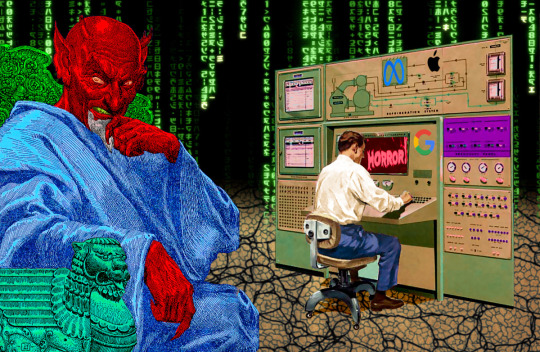
I'm touring my new, nationally bestselling novel The Bezzle! Catch me SATURDAY (Apr 27) in MARIN COUNTY, then Winnipeg (May 2), Calgary (May 3), Vancouver (May 4), and beyond!

Anyone who says "If you're not paying for the product, you're the product" has been suckered in by Big Tech, whose cargo-cult version of markets and the discipline they impose on companies.
Here's the way that story goes: companies that fear losing your business will treat you better, because treating you worse will cost them money. Since ad-supported media gets paid by advertisers, they are fine with abusing you to make advertisers happy, because the advertiser is the customer, and you are the product.
This represents a profound misunderstanding of how even capitalism's champions describe its workings. The purported virtue of capitalism is that it transforms the capitalist's greed into something of broad public value, by appealing to the capitalist's fear. A successful capitalist isn't merely someone figures out how to please their customers – they're also someone who figures out how to please their suppliers.
That's why tech platforms were – until recently – very good to (some of) their workforce. Technical labor was scarce and so platforms built whimsical "campuses" for tech workers, with amenities ranging from stock options to gourmet cafeterias to egg-freezing services for those workers planning to stay at their desks through their fertile years. Those workers weren't the "customer" – but they were treated better than any advertiser or user.
But when it came to easily replaced labor – testers, cleaning crew, the staff in those fancy cafeterias – the situation was much worse. Those workers were hired through cut-out shell companies, denied benefits, even made to enter via separate entrances on shifts that were scheduled to minimize the chance that they would ever interact with one of the highly paid tech workers at the firm.
Likewise, advertisers may be the tech companies' "customers" but that doesn't mean the platforms treat them well. Advertisers get ripped off just like the rest of us. The platforms gouge them on price, lie to them about advertising reach, and collude with one another to fix prices and defraud advertisers:
https://pluralistic.net/2020/10/05/florida-man/#wannamakers-ghost
Now, it's true that the advertisers used to get a good deal from the platforms, and that it came at the expense of the users. Facebook lured in users by falsely promising never to spy on them. Then, once the users were locked in, Facebook flipped a switch, started spying on users from asshole to appetite, and then offered rock-bottom-priced, fine-grained, highly reliable ad-targeting to advertisers:
https://papers.ssrn.com/sol3/papers.cfm?abstract_id=3247362
But once those advertisers were locked in, Facebook turned on them, too. Of course they did. The point of monopoly power isn't just getting too big to fail and too big to jail – it's getting too big to care:
https://pluralistic.net/2024/04/04/teach-me-how-to-shruggie/#kagi
This is the thing that "if you're not paying for the product, you're the product" fails to comprehend. "If you're not paying for the product" is grounded in a cartoonish vision of markets in which "the customer is king" and successful businesses are those who cater to their customers – even at the expense of their workers and suppliers – will succeed.
In this frame, the advertiser is the platforms' customer, the customer is king, the platform inflicts unlimited harm upon all other stakeholders in service to those advertisers, the advertisers are so pleased with this white-glove service that they willingly pay a handsome premium to use the platform, and so the platform grows unimaginably wealthy.
But of course, if the platforms inflict unlimited harms upon their users, those users will depart, and then no amount of obsequious catering to advertisers will convince them to spend money on ads that no one sees. In the cargo-cult conception of platform capitalism, the platforms are able to solve this problem by "hacking our dopamine loops" – depriving us of our free will with "addictive" technologies that keep us locked to their platforms even when they grow so terrible that we all hate using them.
This means that we can divide the platform economy into "capitalists" who sell you things, and "surveillance capitalists" who use surveillance data to control your mind, then sell your compulsive use of their products to their cherished customers, the advertisers.
Surveillance capitalists like Google are thus said to have only been shamming when they offered us a high-quality product. That was just a means to an end: the good service Google offered in its golden age was just bait to trick us into handing over enough surveillance data that they could tune their mind-control technology, strip us of our free will, and then sell us to their beloved advertisers, for whom nothing is too good.
Meanwhile, the traditional capitalists – the companies that sell you things – are the good capitalists. Apple and Microsoft are disciplined by market dynamics. They won't spy on you because you're their customer, and so they have to keep you happy.
All this leads to an inexorable conclusion: unless we pay for things with money, we are doomed. Any attempt to pay with attention will end in a free-for-all where the platforms use their Big Data mind-control rays to drain us of all our attention. It is only when we pay with money that we can dicker over price and arrive at a fair and freely chosen offer.
This theory is great for tech companies: it elevates giving them money to a democracy-preserving virtue. It reframes handing your cash over to a multi-trillion dollar tech monopolist as good civics. It's easy to see why those tech giants would like that story, but boy, are you a sap if you buy it.
Because all capitalists are surveillance capitalists…when they can get away with it. Sure, Apple blocked Facebook from spying on Ios users…and then started illegally, secretly spying on those users and lying about it, in order to target ads to those users:
https://pluralistic.net/2022/11/14/luxury-surveillance/#liar-liar
And Microsoft spies on every Office 365 user and rats them out to their bosses ("Marge, this analytics dashboard says you're the division's eleventh-worst speller and twelfth-worst typist. Shape up or ship out!"). But the joke's on your boss: Microsoft also spies on your whole company and sells the data about it to your competitors:
https://pluralistic.net/2020/11/25/the-peoples-amazon/#clippys-revengel
The platforms screw anyone they can. Sure, they lured in advertisers with good treatment, but once those advertisers were locked in, they fucked them over just as surely as they fucked over their users.
The surveillance capitalism hypothesis depends on the existence of a hypothetical – and wildly improbably – Big Data mind-control technology that keeps users locked to platforms even when the platform decays. Mind-control rays are an extraordinary claim supported by the thinnest of evidence (marketing materials from the companies as they seek to justify charging a premium to advertisers, combined with the self-serving humblebrags of millionaire Prodigal Tech Bros who claim to have awakened to the evil of using their dopamine-hacking sorcerous powers on behalf of their billionaire employers).
There is a much simpler explanation for why users stay on platforms even as they decline in quality: they are enmeshed in a social service that encompasses their friends, loved ones, customers, and communities. Even if everyone in this sprawling set of interlocking communities agrees that the platform is terrible, they will struggle to agree on what to do about it: where to go next and when to leave. This is the economists' "collective action problem" – a phenomenon with a much better evidentiary basis than the hypothetical, far-fetched "dopamine loop" theory.
To understand whom a platform treats well and whom it abuses, look not to who pays it and who doesn't. Instead, ask yourself: who has the platform managed to lock in? The more any stakeholder to a platform stands to lose by leaving, the worse the platform can treat them without risking their departure. Thus the beneficent face that tech companies turn to their most cherished tech workers, and the hierarchy of progressively more-abusive conditions for other workers – worse treatment for those whose work-visas are tied to their employment, and the very worst treatment for contractors testing the code, writing the documentation, labelling the data or cleaning the toilets.
If you care about how people are treated by platforms, you can't just tell them to pay for services instead of using ad-supported media. The most important factor in getting decent treatment out of a tech company isn't whether you pay with cash instead of attention – it's whether you're locked in, and thus a flight risk whom the platform must cater to.
It's perfectly possible for market dynamics to play out in a system in which we pay with our attention by watching ads. More than 50% of all web users have installed an ad-blocker, the largest boycott in the history of civilization:
https://doc.searls.com/2023/11/11/how-is-the-worlds-biggest-boycott-doing/
Ad-supported companies make an offer: How about in exchange for looking at this content, you let us spy on you in ways that would make Orwell blush and then cram a torrent of targeted ads into your eyeballs?" Ad-blockers let you make a counter-offer: "How about 'nah'?"
https://www.eff.org/deeplinks/2019/07/adblocking-how-about-nah
But ad-blocking is only possible on an open platform. A closed, locked-down platform that is illegal to modify isn't a walled garden, a fortress that keeps out the bad guys – it's a walled prison that locks you in, a prisoner of the worst impulses of the tech giant that built it. Apple can defend you from other companies' spying ways, but when Apple decides to spy on you, it's a felony to jailbreak your Iphone and block Apple's surveillance:
https://pluralistic.net/2023/02/05/battery-vampire/#drained
I am no true believer in markets – but the people who say that paying for products will "align incentives" and make tech better claim to believe in the power of markets to make everyone better off. But real markets aren't just places where companies sell things – they're also places where companies buy things. Monopolies short-circuit the power of customer choice to force companies to do better. But monopsonies – markets dominated by powerful buyers – are just as poisonous to the claimed benefits of markets.
Even if you are "the product" – that is, even if you're selling your attention to a platform to package up and sell to an advertiser – that in no way precludes your getting decent treatment from the platform. A world where we can avail ourselves of blockers, where interoperablity eases our exodus from abusive platforms, where privacy law sets a floor below which we cannot bargain is a world where it doesn't matter if you're "the product" or "the customer" – you can still get a square deal.
The platforms used to treat us well and now treat us badly. That's not because they were setting a patient trap, luring us in with good treatment in the expectation of locking us in and turning on us. Tech bosses do not have the executive function to lie in wait for years and years.
Rather, as tech platforms eliminated competition, captured their regulators and expanded their IP rights so that interoperability was no longer a threat, they became too big to care whether any of their stakeholders were happy. First they came for the users, sure, but then they turned on the publishers, the advertisers, and finally, even their once-pampered tech workers:
https://pluralistic.net/2023/09/10/the-proletarianization-of-tech-workers/
MLK said that "the law can't make a man love me, but it can stop him from lynching me." It's impossible to get tech bosses to believe you deserve care and decency, but you can stop them from abusing you. The way to do that is by making them fear you – by abolishing the laws that create lock-in, by legally enshrining a right to privacy, by protecting competition.
It's not by giving them money. Paying for a service does not make a company fear you, and anyone who thinks they can buy a platform's loyalty by paying for a service is a simp. A corporation is an immortal, transhuman colony organism that uses us as inconvenient gut-flora: no matter how much you love it, it will never love you back. It can't experience love – only fear.

If you'd like an essay-formatted version of this post to read or share, here's a link to it on pluralistic.net, my surveillance-free, ad-free, tracker-free blog:
https://pluralistic.net/2024/04/22/kargo-kult-kaptialism/#dont-buy-it
#pluralistic#if youre not paying for the product youre the product#competition#capitalists hate capitalism#discipline#market discipline#the old good internet
193 notes
·
View notes
Text
How to Master Motivation


Hi friends,
Today I want to talk about motivation and finding ways to maintain it in our daily lives. Motivation is a crucial factor that drives us to achieve our goals, overcome challenges, and stay committed to our development.
Understand the locus of control
Our locus of control, internal or external, is the degree to which we believe we have control over what happens to us in our lives. It influences how we respond to circumstances that impact us and how motivated we feel to take action.
An external locus of control is when we believe that our life and the outcomes we experience are a result of external forces beyond our power. We think everything that happens to us occurs because of chance or luck—two things we can’t control.
The key to staying motivated is to develop an internal locus of control. This is when we believe that we’re responsible for the things happening to us and understand that we have control over the outcome. It’s a level of self-determination where we realize our efforts, decisions, and habits create the life we live.
So, how do we adopt an internal locus of control?
The first point I want to emphasize is that, regardless of your perception of how much control you have over your life, the amount of work you put into something is always within your control. The first step is to abandon the mindset that everything is left up to chance and, because of this, you should stop trying. You need to understand that you always have some level of power over your circumstances, even if you’ve been told otherwise:
Be more aware of the choices you make and realize there is always a choice to be made.
Don’t be afraid to ask for help or guidance from those around you.
Spend time self-reflecting and trying to understand yourself better. Reflect on previous instances where you’ve felt a lack of control and write down what could have been done instead.
Don’t be afraid to fail; it’s an opportunity to learn.
Know the different types of motivation
Next, I want to talk about the different types of motivation and how they impact you.
There are 4 different types of motivation, each with their own distinctions:
Intrinsic motivation: This is where you do something because it aligns with your values or just because it’s fun. Although it’s good to have intrinsic motivation, this type is fragile and can be undermined when we start feeling like we’re losing autonomy over our choices.
Extrinsic motivation: This is what most people think of when they imagine motivation. It’s when our motivation comes from outside of us—we’re doing something for a reward or to avoid a punishment. It’s the opposite type of motivation that you should seek if you want to be self-driven.
Introjected: This type of motivation can create resentment or tension. We do something because if we don’t, we’ll feel shameful or guilty. For example, you might go to the gym not because you enjoy it or care about the health benefits, but because you feel guilty if you don’t work out.
Identified: The reason you’re doing something is because it aligns with your idealized self. It’s something that you’ve internalized to be important and allows you to behave in accordance with your self-concept and identity. This is the most important type because it creates habitual behaviors are no longer choices. We understand our identity and that certain habits and behaviors need to be done so that we’re constantly aligned with our higher selves. For example, you might regularly volunteer at a local shelter or organization because you’re someone who values compassion and community service.
So, how can we implement identified motivation more into our lives?
Really try and understand the reasoning behind a goal you want to achieve. Ask yourself “why do you actually want this thing?”. This is also a good time to review your values and whether or not your goal aligns with them.
Constantly remind yourself about why the outcome matters to you because we often forget the reason that we started in the first place. —ex.
Like James Clear said, make your goal, system, habit, or whatever you’re wanting to accomplish more motivating or fun. Beyond that, start associating the reward with the challenge itself. If you’re training for a marathon, instead of seeing the finish line as the only reward, find or fulfillment in the training process and the discipline you developed along the way.
Adopt a positive mindset. Rather than complaining about having to workout in the morning or studying for an exam, start saying “I get to study for this exam and further my education” or “I’m blessed to have a body that works for me and allows me to exercise”. It’s all about perspective and embracing gratitude. If you put half the energy that you use from complaining into figuring out how to take the next step, you’ll accomplish a lot more.
Don’t neglect your emotional and mental health
Slumps are very real, and mental health can impact every aspect of motivation. Self-improvement and changing your life aren’t easy journeys by any means, and there will be times when stress and feelings of being overwhelmed can paralyze you. In these moments, it’s critical to take a break, a breather, or anything that can help reset your mental health. Remember to engage in activities that support your emotional needs. Not every second of the day needs to be spent doing something productive or working toward your goals. It’s okay to take breaks and have rest days; in fact, I think it’s crucial.
Reward yourself often, even for the smallest achievements. It’s not about what you completed, but the fact that you completed something at all. Spend time acknowledging your accomplishments.
Take it one step at a time and remember no action is too small. Starting small is what helps us build consistency in the long run.
Embrace positive self-talk. Avoid talking yourself into a negative spiral, as it will only make you lose motivation and put you in a slump.
Get an accountability partner. Having someone in your corner who will cheer for you and keep you accountable is a game changer.
Stay motivated, stay grateful, stay resilient.
Love,
Luna<3
#self concept#Identity#self development#goal setting#self discipline#self improvement#self care era#self care#self love#glow up#positive mindset#positive thoughts#mental growth#mental health#that girl#good habits#itgirl#leveling up#habits#productivity#aesthetic#clean girl#self reflecting
439 notes
·
View notes
Text
how to get good grades (without excessive studying)⋆.ೃ࿔*:・📄

its rly easy to get a good grade in a class without doing a lot of studying or getting perfect scores on tests and exams. not to say that studying doesn't help get you good grades, but there are alternative ways to get a good grade in a class.
do the extra credit
even if u dont need it right at this moment, a little boost is always helpful, bcuz who doesn't want extra credit?
do the homework
most of ur grade comes from homework/classwork so DO THE HOMEWORK. also, doing homework is BASICALLY studying. if u have trouble keeping up with/submitting assignments use a planner so that then u can stay on top of ur assignments.


project = easy test grade
if ur not a good test taker, take advantage of projects and do ur best to get good scores on the projects bcuz thats an easy test grade.
back to the planner concept
in your planner, write out the assignments that you MUST do in chronological order, meaning the assignment thats due the soonest is the one that u should do NOW. if it helps, color coordinate based on the most urgent assignments -> assignments where u have a bit of leeway
assignments with leeway
get the assignments with leeway out of the way so that then u dont have to deal with it later. when u do an assignment early, reward yourself for it so that then you'll wanna do it more.
#advice#it girl#becoming that girl#self care#self love#that girl#it girl energy#honeytonedhottie⭐️#studying#pink academia#academic weapon#academic validation#getting good grades#self improvement#self discipline#highschool#students#girly#dream girl#dream girl tips#girl blog#girlblogging#dream life
359 notes
·
View notes
Text
saying "it is not necessary to have sweets every day" should not be seen as controversial, but i have had people go for my throat for that take. its literally unthinkable apparently not to have a sweet treat on the daily (or multiple times per day).
i'm not saying "sugar bad" or anything, it's good to enjoy a little dessert every now and then. but i think a lot of Americans are so used to having a diet high in sugary foods, and it's so normalized and what so many people grew up with, that me saying "your kids don't need to have dessert every day" is accused of toxic diet culture mindset and depriving children of joy.
and the thing is, our sweets are really sweet. you don't notice it when you grew up with it, it just seems normal. but if you travel elsewhere or go on a low-sugar diet, suddenly our ice cream and cookies and donuts seem un-appetizingly overly sweet.
anyways i'm not saying don't give your kids dessert, but i think a lot of Americans underestimate how addicted they are to sweets. if the mere suggestion to limit the intake to once or twice a week gives you a knee-jerk reaction of fear/horror/disgust, "i could never! i earned this!", there is a problem.
#occasional treats are good!! not saying no sugar ever or whatever but it is WEIRD how adamant Americans are about needing#to have a sugar fix every day#listen to me *grabs your face* you dont NEED it and you should not feel like you NEED it. thats called sugar addiction.#i promise that if you lay off the desserts/sugary snacks/etc and regulate them to just a few times per week#your palette will adjust and you will not crave it every day#also btw sometimes craving sugary foods is your body's way of telling you than it just needs more calories so like. eat some more food.#this was inspired by that tumblr post that was like 'i let my daughter eat dessert first if she wants because i dont want her to develop#an unhealthy relationship with food' like HUH???? learning basic discipline with foods is kind of a necessary human skill tho??
174 notes
·
View notes
Text
i think this is the first year i’ve really started to realize that there isn’t a magical switch that will flip where i’ll suddenly be happy every single day of my life, it’s just life and finding the joy in it day by day and if it isn’t there making choices to add more of it and while that’s a lot of persistent disciplined work with the meditating and the physical exercise and forcing myself to read instead of letting myself rot on tiktok i think right now i’m happier than i’ve ever been before idk
#just feeling rly good abt mental health things right now#i haven’t had like a Breakdown™️ in a really long time i think bc i’m way more practiced at moving through bad days#and my self discipline is way better i think that’s been a HUGE part too#i wasn’t even on my own side before
244 notes
·
View notes
Text
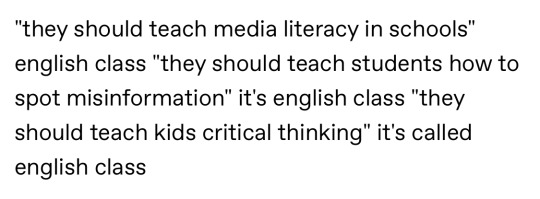
still mad about this post lol so let me also say: “they taught us critical thinking in english class” is extra funny to me because there’s a genuine debate among Ed Heads about whether “critical thinking” as a discrete and decontextualized skillset can actually be taught :) so it’s pretty silly to go around confidently branding yourself as a critical thinker while simultaneously revealing that you’re extremely comfortable making assumptions about the relative simplicity of complex ideas which remain contested in their respective fields :) personally i would be pretty embarrassed to call myself a critical thinker if i also couldn’t stop myself from revealing i was totally lacking in the intellectual humility that would enable me to understand that we have yet to reach consensus on unbelievably complicated issues like how best to educate an entire population :) but i guess i was absent the day that tenth grade english covered running your mouth like an asshole on social media :)
#for someone so convinced english class made you smart you’re saying some pretty stupid shit!#i’m also genuinely curious about this person’s english class bc i went to a fancy high school and my english teachers were mostly fine#and i would not connect literally anything we ever did there to the concepts of media literacy or misinformation spotting#i would also be shocked if a majority of current high school english teachers are good at those things themselves. lol.#remember: teachers are being taught that learning styles are real and most of them never question it!#btw i’m inclined to go with the ‘critical thinking is discipline specific and can’t be taught as a Thing crowd’#my unsubstantiated hunch is that like#being exposed to critical thinking processes in a variety of different fields#can build the kind of intellectual humility that is the most important prerequisite for critical thinking#like because i know how much goes into ‘knowing’ something historically#i know that i can’t really meaningfully critically think about high level debates in biology because the knowledge base isn’t there#and knowing that is IMO its own form of critical thinking#but that’s me spitballing based on vibes
161 notes
·
View notes
Text
Really hard to not reach through my phone and violently shake the person that said she woke up at noon, played a game on her phone, took a nap, again on her phone, took another nap, etc. for the whole day and then be like “omg yas queen, we all need ✨Self Care™️✨ days!”
I will put this as monosyllabic and with as much love as possible.
That is not and will never be a “✨Self Care™️✨ day”. If you are waking up at noon, not moving from your bed, sleeping even more, not eating, endlessly scrolling your phone that means something is wrong and you should see a medical professional about it.
#shenzi rambles#take it from somebody with chronic depression#that isn’t a self care day it’s a cry for help#I completely understand that depression can hit you in the gut and you’ll be down for the count#but do not conflate days of depression with self care#self care in this case would be utilizing your discipline to brush your teeth/shower/change clothes/eat#oh my goodness this podcast I listen to just has…so much wrong information
198 notes
·
View notes